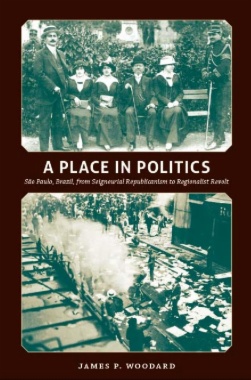A Place in Politics is a thorough reinterpretation of the politics and political culture of the Brazilian state of São Paulo between the 1890s and the 1930s. The world’s foremost coffee-producing region from the outset of this period and home to more than six million people by 1930, São Paulo was an economic and demographic giant. In an era marked by political conflict and dramatic social and cultural change in Brazil, nowhere were the conflicts as intense or changes more dramatic than in São Paulo. The southeastern state was the site of the country’s most important political developments, from the contested presidential campaign of 1909–10 to the massive military revolt of 1924. Drawing on a wide array of source materials, James P. Woodard analyzes these events and the republican political culture that informed them.
Woodard’s fine-grained political history proceeds chronologically from the final years of the nineteenth century, when São Paulo’s leaders enjoyed political preeminence within the federal system codified by the Constitution of 1891, through the mass mobilization of 1931–32, in which São Paulo’s people marched, rioted, and eventually took up arms against the national government in what was to be Brazil’s last great regionalist revolt. In taking to the streets in the name of their state, constitutionalism, and the “civilization” that they identified with both, the people of São Paulo were at once expressing their allegiance to elements of a regionally distinct political culture and converging on a broader, more participatory public sphere that had arisen amid the political conflicts of the preceding decades.

